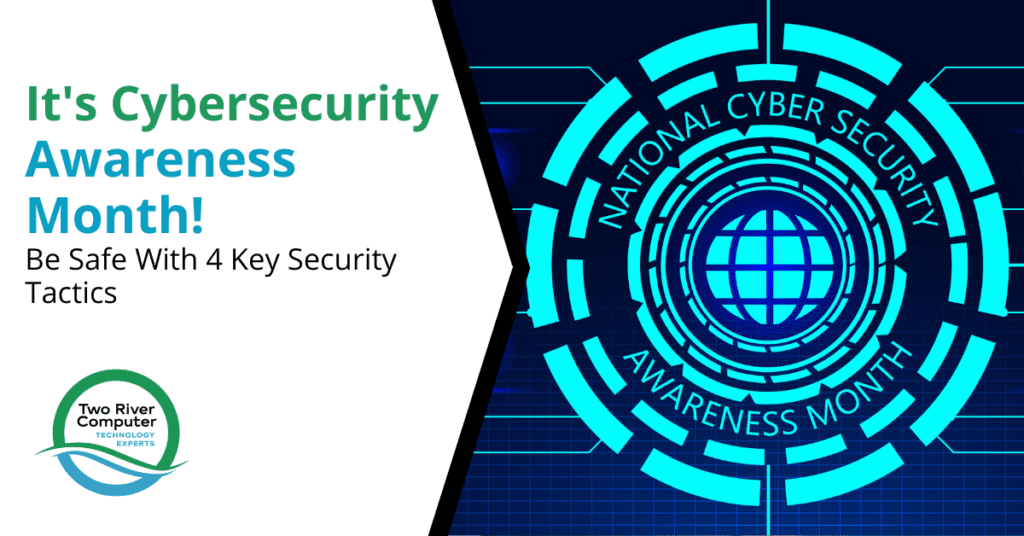
October is internationally recognized as cybersecurity awareness month: an initiative that aims to shine a light on what cybersecurity best practice looks like, while also highlighting the range of cybersecurity threats out there.
For businesses and individuals alike, this month is a great opportunity to brush up on your cyber hygiene skills – especially as cyber-attacks increase and become more common. In 2022 alone, we’ve already experienced over eight million data breaches across the globe.
To protect your home, your organization and your data, you need to take action. You need to know the different types of cybersecurity that can protect your computers, mobile devices, data, and other electronic devices and systems.. With that in mind, here’s a handy list of cybersecurity tactics you can follow each day to stay secure online.
Four Security Tactics To Stay Safe Online
The below tactics are great because they apply to both organizations and individuals. Whether you’re looking to keep your personal devices safe or the whole corporate network secure, our tips apply to you. This comprehensive Google Cybersecurity Certification Review analyzes the pros, cons, topics covered, and value of Google’s job-ready cybersecurity certificate.
Let’s dive in!
Keep your software up to date and automate the process if you can: The applications and devices you use receive regular software updates that improve functionality and enhance security by fixing vulnerabilities. We are all guilty of clicking ‘remind me later’ when the software update pop-up appears, but this is a bad habit to get into. When you don’t regularly update your software, you are more vulnerable to hacking incidents. So, ensure to update your software as soon as a pop-up appears. If you’re concerned that you may forget to update your software, or are worried about employees slacking on updates, consider automating the software update function, so that it happens without you having to click a thing!
Use strong, complex passwords and multi-factor authentication: According to research, passwords are the most common way by which hackers break into people’s online accounts. If you use guessable passwords or the same passphrase across your accounts, you’re more vulnerable to this kind of exploitation. Luckily, combatting password theft is an easy fix. You should use a unique, complex password for each of your digital accounts. To help you remember these different passwords, you can use a free password manager tool that stores all your online passwords for you. Lastly, for sensitive accounts like your online bank, make sure to use multi-factor authentication (MFA) as well as a password for maximum protection. If you’d like at-home support with boosting your account security, we can help you set up a password manager and MFA.
Know how to spot phishing scams: In a phishing scam, a hacker will send you an email pretending to be a legitimate person or organization. They’ll often pose as authoritative bodies like healthcare companies or the government. Typically, these emails will either contain an attachment riddled with malware, or a link to a fake website where you are asked to share sensitive information like your bank details. Phishing emails are a huge trigger for fraud and data breaches, so knowing how to spot them is vital. Look out for these key signs when you receive an unexpected email:
- Spelling errors in the body of the email
- An email address that looks suspicious
- A sense of urgency to the request that is unfounded
If you’re not sure whether the email is legitimate or not, go to the company’s website by typing the address into your search bar. Head to the contact page of the organization and ask them to verify their request.
Keep an eye on your cloud access controls: Cloud apps like Google Drive, Box and Microsoft 365 are great for both organizations and individuals. Whether you’re sharing files or photos, the cloud enables you to do so seamlessly and effortlessly. While the cloud is mostly secure, people often incorrectly configure their online files, making them vulnerable to public exposure. With that in mind, it’s crucial to educate yourself on how to securely configure access permissions in the cloud. Make sure to set all your cloud files to ‘private’ to prevent any accidental leaks.
Make Every Month Cyber Security Month With Our Support!
These security tips are designed to boost your cybersecurity resilience so that you are less vulnerable to cyber-attacks and more online savvy. While this list covers the basics, there’s still a lot more to learn and do to stay safe 24/7!
That’s where we come in. Our dedicated, expert team is on hand to safeguard you and your data from the myriad of cybersecurity threats out there.
We’ll Help Your Home or Business Improve Online Security
Are you concerned about the security of your home or corporate network? Well, worry no longer! Two River Computer will give you maximum security online.
For further inquiries, contact us today.


